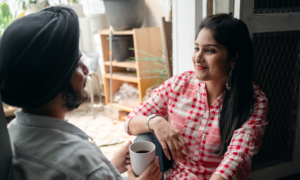A while back I heard some discussion around the rising “Friendship Marriage” trend in Japan and it intrigued me. ‘Friendship marriage’ is where couples decide to move beyond romantic or physical bonds for companionship and shared interests. And this got me thinking… does this indicate a new-age shift entering the relationship norms?
Let’s break down why people chose to get married in the first place.
As per evolution people chose monogamy and marriage as a win-win arrangement for the couple. The man went outside of home to fight against danger and brought back food. He protected the woman and made sure she had food to eat, house to live in, and so on. In return, the woman kept the home clean and cooked food and looked after his needs and his children. It was a mutually beneficial arrangement that worked well even though man evolutionary was not meant to be a monogamous being. Procreation was another need that was being mutually met.
Fast forward to a moment in time, crossing many decades of evolution & religious influence, marriage became a sacred institution that the society gave enormous weightage to. Marriage become a parameter that determined an adult’s success in life as well. Marriage & family soon became a societal projection adults did to portray one’s value system and growth in life. It became one’s lineage in society that continued to add value to the family and its members.
Fast forward to recent past where marriage in the heels of the woke movement became a choice that two consenting adults made to celebrate their union in love and create the dream of marriage and/or family, looking forward to the idea of growing old together!
Psychologically speaking, why do we need a partner?
Because as humans we have an innate desire to be seen and heard and that level of unhinged acceptance can come from finding a companion who understands you irrevocably. A companion who becomes your constant support, your well-wisher, your friend, your critic and someone you can depend on reliably.
Keyword being ‘companion’. The thing about companions is that they can come in all shapes and sizes. You can have a deep emotional connect with someone and not feel any lust or romance towards them. That’s the beauty of human relationships. The probability of this kind of friendship working increases when the need of lust is being met outside of their relationship, like an open marriage.
This is the trend of what we are seeing in Japan in what they call a ‘friendship marriage’. It can be viewed psychologically as the need of a comrade that you can call your own, hold accountable without the dependency of physical intimacy, hang out with, be honest with, be happy for, give space to, and treat with equality without any backlash of ego. Because traditionally when there is an expectation of sex or romance, honesty and accountability is not on the cards. We tend to ignore the same for a certain ‘benefit’ or ‘peace’ at home. This relationship dictates an open marriage while still meeting the psychological need of finding a life partner that you can depend and rely on.
Conventionally once people get into a relationship of marriage, individual ego and expectations enter the equation. There is now suddenly an expectation of the partner to move from say being a girlfriend to a wife; and abruptly bear all the social responsibilities that come with it.

Traditional relationship adheres to the social norms of maybe man earning more than a woman. If that is not enough, there is now an implicit variable that has entered their relationship unknown to the couple, that of a power dynamic- who is more powerful at home and why? Who will have the final say? Society dictates responsibilities to be shouldered in a traditional way with woman now bearing the load of the house and kitchen.
The same couple before marriage as friends may have experienced a contrast image with responsibilities being more or less equally shouldered during time spent together. Maybe there was a mutual understanding and acceptance of each person’s growth and care in terms of self-love. Somehow saying “I do” changed so much for them.
If saying I do takes away my right as an individual and instead burdens me with responsibilities I don’t want and forces me to conform to a social structure that I know is limiting for my growth, why choose the same? This is the reason this trend is gaining the popularity it is and at the pace it is.
Given this perspective, we can expect today’s youth to accept and adapt this trend more from a point of self-preservation and growth. To choose to continue to feel freedom and not be burdened under any social ‘premise’. To choose companionship, friendship and care over traditional romance. To break free from the burden of traditional role expectations in a marriage and focus on the bigger picture of individual happiness.
But like everything we know, there are 2 sides to the coin.
While this arrangement may seem like a win-win, what happens if you do fall romantically in love with your partner, but your partner does not? If your arrangement was an open marriage and when you see your friend bringing company and showering affection that maybe you want; imagine the psychological impact that situation can create for you and how things can go sour before you even realize.
If the premise of the relationship is not to get involved, breaking the premise will come at a cost, won’t it?
Also, what happens after you have kids in such an arrangement? What does parenting look like in such a set up? Like any marriage graduating to being parents, this relationship will now need some work and attention.
But the real question is- can you really control your heart and ask it to not fall romantically in love and not be possessive about your friend, your companion? What happens when your emotions are not reciprocated? Does it affect your friendship which is the reason why you got into this arrangement in the first place? How can you now undo something and start afresh?
This is where self-awareness journey and knowing who you are comes in. So, what is your take on ‘Friendship Marriage’ trend and do you feel it will become a new relationship norm globally or even for Indian couples?
Also Read: Understanding Trending Gen Z Dating Terms
Meet our Expert Guest Author: Harleen Bagga is a multi-disciplinary psychotherapist, author, and corporate wellness & transformation coach. With a focus on self-awareness and sustainable transformation, she connects deeply with her audience, using her life experience and spiritual outlook to build meaningful connections.

